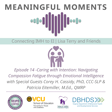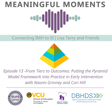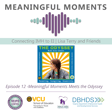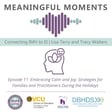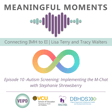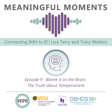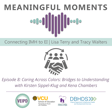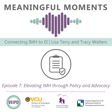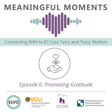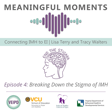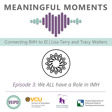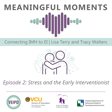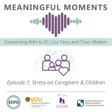Become a Creator today!Start creating today - Share your story with the world!
Start for free
00:00:00
00:00:01

Postpartum OCD with Valerie Abbott
In this episode, Valerie Abbott joins Lisa and Tracy to share her lived experience with Postpartum OCD. Thank you, Valerie, for being open, honest, and vulnerable with us.
Visit https://veipd.org/main/index.html or https://www.vaimh.org/ for more information.
Transcript
Introduction and Focus on Postpartum OCD
00:00:11
Speaker
Welcome everyone to Meaningful Moments podcast connecting infant mental health to early intervention. This is our episode all about unpacking postpartum obsessive compulsive disorder.
Collaboration with Virginia Department of Behavioral Health and VCU
00:00:24
Speaker
This podcast is a collaborative effort from the Virginia Department of Behavioral Health and Developmental Services and that is through a contract with the Partnership for People with Disabilities at Virginia Commonwealth University.
00:00:38
Speaker
My name is Lisa Terry.
Introductions: Lisa Terry and Valerie Abbott
00:00:40
Speaker
I am an Early Intervention Professional Development Consultant at VCU Partnership for People with Disabilities. I also am endorsed as an Infant Mental Health Mentor in Research and Faculty, and I am the co-facilitator of DEC's Infant Mental Health Community of Practice, and DEC is the Division of Early Childhood, for those that do not know. And I am also a zero to three growing brain trainer.
00:01:05
Speaker
So I'm going to go ahead and let our guests, our very first guest for our podcast introduce herself. So Valerie, go ahead and give us a little introduction. Thank you
Valerie Abbott's Personal Story and Early Intervention Role
00:01:15
Speaker
so much. This is so exciting. Um, my name is Valerie Abbott and I first and foremost, I'm a mom of two girls who are now off in college. Absolutely crazy to even say that out loud. So I'm a proud mama.
00:01:30
Speaker
But I am also a certified early intervention service coordinator here in Virginia. And what's really wild is I think I'm sitting in the same chair as the service coordinator that helped our family many, many moons ago. So that is a full circle place. It really is.
00:01:47
Speaker
I love that so much. Thank you, Valerie. We're super excited for you to be here and share your story with us and really be vulnerable with us today. Tracy, I'm going to go ahead and let you introduce yourself and get us started. Yeah, guys. Hi, it's so good to be back in this space with everybody. Valerie, we are super psyched about here and all the information you have to share with us today. We're really celebrating you being our first guest. My name is Tracy Walters and I am seated at DBHDS.
00:02:14
Speaker
I am also in the mental health work. I'm the state coordinator for Infant and Early Childhood Mental Health. I'm an incredible years trainer and facilitator and I'm also an end of life doula.
Defining Postpartum OCD and Misconceptions
00:02:25
Speaker
So that's just kind of another nugget of me. So, so happy to be here and we have so much to unpack. I'm going to go ahead and get started if we're all to go. So today we are here with Valerie super psych talking about postpartum depression OCD.
00:02:43
Speaker
And this was new topic for me. And I know that a lot of us have heard about postpartum depression and that seems to be like an invalid. You'll probably speak to this, but you know, that seems to be like the main theme, right? That we understand and know about and have the most information about. But today we really want to dig into this OCD piece. And so I'm just going to start with the definition and it's coming from postpartumdepression.org.
00:03:07
Speaker
And basically what I found was it's a definition, it's characterized by intrusive thoughts and behaviors that are in response to a perceived danger toward their baby and their mother's baby. And these thoughts and behaviors are constant and repetitive.
00:03:23
Speaker
and they can severely disrupt your daily life. Postpartum OCD is a severe condition that requires treatment to manage and control symptoms. It's also noted that this can occur with men as well, which I think is fascinating. I would not have anticipated that, so I hope everybody's learning with me. So with men as well.
00:03:47
Speaker
from the natural fear and anxiety that comes with the pressure and responsibility of caring for an infant. And even when we think about typical responses, I'm just going to say when we become new parents, right, that's a big fear. And so this just like triggered so many thoughts for me when I was reading that definition. I am going to go ahead too and give the stat and just see what that is telling us. Let me pull down on this a little bit. So statistically,
00:04:16
Speaker
What I found was when looking at the statistics, it can affect anywhere from three to 5% of women. And this is likely underdiagnosed, which can be from the lack of awareness or the embarrassment and shame that women feel and fear that they will lose their baby if they share the feelings. And so I thought that was both terrifying and also very awakening to think about you have all of these things happening with you as a new mom.
00:04:45
Speaker
and scared to share it because of what you might fear the repercussions are. So those were like the definition, fascinated by the definition that included men and then the statistics in terms of percentages and the fear of losing baby, which is unmeasurable for me.
Valerie's Experience and Challenges with Postpartum OCD
00:05:07
Speaker
Yeah, thanks Tracy. Well, and it's so crazy because I think, you know, it's so hard being a parent right now. And I know we've talked about this in past episodes, but just the judgment that we receive from the outside world, from other people, from strangers, from family too, right? We even get it from them and there's just so much judgment. And so I think when we're talking about this topic, it's just, it's so important that people really do learn how to advocate for themselves. And that's why I think it's so cool that
00:05:35
Speaker
Valerie really approached us about this topic and she came in and she was like, I want people to know more about this. We have to talk about what this is and what this looks like. So I'm going to go ahead and give some of the symptoms and then we're going to have Valerie actually share her story and she'll share what she was feeling and the symptoms that she experienced too. So typical symptoms are unwanted images of hurting the baby, like dropping the baby or throwing the baby,
00:06:02
Speaker
concerns about accidentally causing the baby any kind of harm through carelessness or intrusive and unwanted thoughts of suffocating or even like stabbing the baby, unwanted and disturbing thoughts of sexually abusing the baby, scared of making poor choices
00:06:21
Speaker
or poor decisions that will cause the baby any kind of harm or death and fear that the baby will develop a serious disease. And then the last one is fear of exposing the baby to toxins and chemicals and any other environmental factors too. And so Valerie, you are really coming here today to help raise awareness for this topic and to share your own personal experience.
00:06:47
Speaker
And so I would love for you to just tell us a little bit more about your story. Tell us about the feelings and the symptoms that you experienced too. Sure. Thank you so much. And thank you so much for recognizing the importance of talking about this. This for me happened 21 years ago. And what's amazing to me is that in that time, I haven't really seen an increase in conversations about it. And that's really disturbing.
00:07:16
Speaker
on behalf of mothers everywhere. So when my daughter, when I was pregnant with my daughter, it was a very normal pregnancy. She was giant. She was nine pounds. She came out via C-section because she was breach and giant. And within hours, within hours of her birth, I'm sitting in, you know, lying down in that hospital bed and, um,
00:07:44
Speaker
these very strange thoughts just started to present themselves. And it was, you're recovering from a major surgery and you've got family in the room and you're not sleeping and they're telling you how to breastfeed. There's so much going on. But in the background, there's this bizarre set of, it's really even hard to describe. The first few days were hard to describe because you're kind of,
00:08:13
Speaker
already overwhelmed and there's a lot of sensory input going on that it was easy to kind of be distracted from these visions. And that's what they were. They were visions for me. And so I came home and things settled down and my mom stayed for a couple of days and then went back to Florida and then it was just my husband and I and it was winter time. And these visions
00:08:40
Speaker
that were so disturbing. I'm not sure how deeply you want me to go into the reality of what this was, but it was really... Valerie, I think you should be very, if you're open to being very real and honest with us, let's go ahead and do it if you're okay with that. So, of course there were the visions and the worry of I'm gonna drop her, but it was envisioning dropping her
00:09:09
Speaker
on surfaces that weren't there. So it wasn't just dropping her, it was dropping her on a bed of nails. It was dropping her on a floor filled with glass. There were things like cutting her, or her being cut, or her being sliced. It was things like seeing her, these visions of crushing her bones, her bones being crushed, her skull being crushed,
00:09:38
Speaker
Copious amounts of blood coming from somewhere of her being burned. I mean it's and and what's crazy about the whole thing is is you're seeing these things and Envisioning this future this you know, it's not that this was happening in real time. They weren't hallucinations it was what if
00:10:03
Speaker
what if this happens and you have a very clear picture of what that is and it was all consuming and it was 24 seven. And that was right around the time in history where I don't know if either of you remember the woman who drowned like six of her children in the bathtub. Yeah, I remember that. Yeah. So that was still on everyone's mind. You know, the woman who drowned all of her kids and were like, how did that even happen? And so in my mind,
00:10:33
Speaker
I'm thinking I'm her. That's what this is. Oh my God. And so I did not say a word to a soul, including my husband who was home for paternity leave. Didn't say a thing because what was I supposed to say? How was I supposed to describe this? And it led to a lot of sleep deprivation, not because I couldn't sleep,
00:11:03
Speaker
but because I was so stressed that, you know, that, you know, I didn't have these dreams when I was sleeping, but just the stress of, of just kind of winding down to get to a sleepy state was very difficult. And, and that's what, that's what the symptoms were like for me was that these unbelievably crystal clear visions of what could and maybe would happen. And yet,
00:11:32
Speaker
What are the chances of you dropping a, how would that even happen? How would your child's hand get sliced by a meat slicer? You don't have a meat slicer. You know what I mean? Is that kind of, that kind of thought.
Seeking Help and Therapy Breakthroughs
00:11:45
Speaker
And it came within hours of her birth and without any history of OCD for myself personally. So it really, it really caught me off guard. Valerie.
00:12:02
Speaker
I'm bursting over here. My heart is like seriously breaking for you at the moment because one, I'm thinking about
00:12:13
Speaker
You just had your baby and then this is like right on top of you. It just came immediately. And I'm just remembering, and Lisa, I know you remember too, like what it's like to hold that baby. Cause we're all moms. Some of us are grandmothers and you hold that baby. And then, you know, it's just like all the things that are rushing through your mind, right? All the detailed things that you're thinking about, you've been hoping for, you've been wishing for. And then for you to have that start happening for you pretty immediately without
00:12:40
Speaker
any time, it sounds like, and you can correct me, to enjoy the baby, right? Just to really embrace that joyful time. And then to have that fear with somebody you know and love and have built a family with, that fear of even sharing it with that close partner, I can't imagine. I could cry a little bit on that because I can see how painful that must have been. What do you think, Lisa? I mean, I know you're sitting there too as a mom.
00:13:10
Speaker
I know. It's so hard to just imagine everything that you were going through, Valerie. But I think even thinking, and we don't talk about this enough either, but it kind of just reminds me of that grief that mothers feel
00:13:27
Speaker
when they do give birth, that grief over the pregnancy and there's like this complete disconnect between the mom and the baby too, like almost immediately because we've all seen the movies, right, of people giving birth and what do we picture? We picture this beautiful baby getting handed over to their parent and it's like instant connection, right? But the reality is that doesn't always
00:13:49
Speaker
happen. And that's because of that grief too, of the loss of the pregnancy. And so I think, you know, like that is just something else that it reminds me of on top of it, but everything that you're going through and that you were feeling and just how scary, especially during that time of that news story, like I wouldn't want to tell anybody either, right? I mean, like you're going to feel like you're getting blasted or going to be put in an Institute or something, right? Yeah.
00:14:19
Speaker
Yeah, the other part of that too is just thinking about this internal dialogue. Valerie, it sounds like you were having with yourself, like on the one thing you will have this thought about your baby. And then there's the other part of you is like, how would that even happen? You know, like you don't have this thing or this is not in your environment necessarily. So I'm just thinking about, you know, the hormonal rush that happens for us as women also, right? And the adjustments and the shifts and, you know, we're crying one minute and we're getting the next minute.
00:14:49
Speaker
But I'm just wondering, how was that for you? Because just having that internal dialogue must have been terrifying. It was. And recovering from a C-section is not easy. I remember being very jealous of the women who were walking around the labor and delivery area. And they could walk out the door in two days. And here I am wondering if I'll ever stand up upright again.
00:15:16
Speaker
but this, you know, it's, it's interesting because I, and it's hard for me to even explain it, but the difference between a thought and a vision is, is, and this is coming from just Valerie Abbott, not, you know, not, I don't know if this is true or not, but you know, a thought is something that I feel is in some way,
00:15:41
Speaker
just kind of inspired by you. You know, you have a thought about something. You initiate the thought, you know, or you determine whether you're going to think about that or not. A vision with OCD is completely out of your control.
00:15:57
Speaker
You have no control over where it goes, what it does, how clear or unclear it is. But it's not a hallucination. Where a hallucination, you know, you see something and it's there. It's right there. This is, you know, a vision is very different. And for those people who have never had one, it's really difficult to explain because it sounds like it could be, you know, oh, you know, intrusive thoughts.
00:16:23
Speaker
It is, it's an intrusive thought that you have no control over it whatsoever. And that's a scary thing. Imagine, right, if you had no control over your thoughts.
00:16:36
Speaker
Yeah. So Valerie, I just want to clarify. Let me see if I'm understanding this correctly. So it's almost like it's not like you're actually seeing it happen, but you're picturing this very detailed story. It's like a movie in your head that you can't stop and it just keeps coming at you. Exactly. It's like a movie. And we've all done that. We've all kind of imagined something. Imagine yourself on a beach or imagine yourself in the mountains or imagine, and you can really
00:17:05
Speaker
like get really crystal clear images, but that's your controlling that. Someone, either you or someone else is saying, close your eyes and imagine, well, imagine no one's telling you that. They're graphic and it's happening with your eyes wide open. And so when it came to, you know, it was about three weeks in when my husband went for a haircut. He left the house for the first time and he left and I was
00:17:34
Speaker
just, I mean, on fire. I was just like, at some point, do I, you know, what, what am I going to say? How exactly am I going to say this? And he came in, he came in after the haircut and I was sitting by myself in the living room. And I don't remember, Mary Claire was probably sleeping in the crib or something. And I said, I have to talk to you. And he was like, okay. And so he sat down and I said, I have to tell you something. And I understand if
00:18:02
Speaker
It requires you to leave with Mary Claire and go like live with your mom. And he was like, what are you talking about? And I was very serious and I said, something is happening and I don't understand it, but I understand if you have to take her to live with your mom. And he's like, why would I need to do that? And I started to unveil a little bit about what was happening.
00:18:34
Speaker
And he said, he's so amazing. He said, first of all, I'm not taking the baby and going to live with my mother. That is not happening because that doesn't need to happen. And somebody somewhere knows something about this. And so we're going to find that person. And I just fell apart and was like a mess. And, and so
00:19:00
Speaker
that it was a different layer of worry now. I've now let my truth out without knowing what is the consequence of that and was completely convinced that once a professional knew what was going on, then they were going to take the baby. But in my mind, I'm thinking it would be better if Chris is already out of the house and living somewhere else with the baby when I reveal this so that they don't have to take the baby. The baby's already somewhere else. Again,
00:19:28
Speaker
We don't think this way. This is not brain usage. I, first of all, the, the courage it took to like, go ahead and get yourself seated and prepared for that conversation. Like I can so deeply feel that what that must've felt like for you waiting for him to come home for you trying to build that courage to like have that conversation when you had been worried about that.
00:19:54
Speaker
How did you muster that encouragement right there to do that, that courage to like really, was there like a sentinel event that you're just like, this is the time or did you
00:20:05
Speaker
Was it just him leaving the house? I'm just curious. Like, you know, I don't remember specifically what prompted me. Like that was the moment I do suspect that it had something to do with the fact that, all right, he was leaving. I didn't want him to leave. I knew we had to, you know, this is unreasonable, you know, and I hadn't said you can't go anywhere. It was just, we hadn't. And something within me, I do remember during his absence in that, what was it, an hour, maybe was,
00:20:34
Speaker
it's now or never. We're just gonna see, we're just gonna do this. And so in the weeks that followed that, I was very fortunate to work for a company that had an EAP, Employee Assistance Program, I think, and called their hotline. And I said, I just had a baby and I'm with my husband and I'm struggling and I need to talk to somebody. And they're like, so what, tell me what's going on? And I was like,
00:21:04
Speaker
It's just hard. Like I didn't, I didn't say anything about what I was experiencing. I was just like, it's just hard. They're like, can you go into more detail? Like it's very difficult. I would not relay what was really happening to anyone. And so they said, okay, well, you know, we can, we can help you find a therapist and you can talk with a therapist and see kind of where we go from there.
00:21:27
Speaker
And so I was fine with that. I've been into therapy before like, okay, fine. And when we walk, this is a week or two later, my husband's carrying the car seat. I'm walking reluctantly into this office building and I see the initials on the door, licensed clinical social worker, social worker, social worker, walk, walk, walk.
00:21:52
Speaker
social services is going to take my baby. And I turned right around. I was like, we're out of here. We're out of here. And he's like, no, no, no, no, no. I said, she's a social worker. He said, I don't think she's that kind of social worker. I don't think, let's just go in here. You don't have to say anything. And I was like, okay. And so we went in and I clammed up and the woman's like, what brings you here today? And I was like,
00:22:17
Speaker
I'm just tired and he told me a little bit. I was, I was giving her nothing. And what I found interesting was that my husband didn't say anything. I don't know if he called her in advance or not. I really don't know, but she said, are you having really upsetting visions? And I was like, I think I am. And she was like, Oh, are they,
00:22:45
Speaker
Do you have visions or worry about like really bad things happening to your baby? And I was like, I am, yes, I am. And she's like, did you know that that's not uncommon? And I was like, no. And she said, yeah. And it was, so she popped the bubble. She was the one who kind of put that out there. I love how she normalized that for you. Yes. Because I feel like that opened it.
00:23:13
Speaker
Yeah. And so she said, nothing you can say right now, even if you think you would guarantee that we would take this baby in and I can guarantee you that won't happen. So that was a gift. Yeah. I don't know how to get that. Honestly, I still don't know. But she said, anything you tell me, you know, what you're experiencing is not going to result in.
00:23:42
Speaker
your baby being taken from you. And so that, you know, that cultivation of trust was what ultimately reluctantly led me to share kind of how bad it was. And up until that point, my husband hadn't even known the depth and the graphicness of it all. And so she said she gave me a book
00:24:08
Speaker
And it was at a print and she said, I only have one of these left. And it was called, so the title was something like, I didn't think it would be like this or something like that. And it was a journey with OCD, post-partum OCD. And it was like, I could have written this title. Like this is, this is, and it was all, I mean, all the things I was experiencing. And so that helped. And then she said, you know, we're going to need to do some
00:24:33
Speaker
talking on a regular basis. And she said, I really think you should see a psychiatrist. Would you be open to medication? And I said, absolutely not. And she was like, oh, okay, we have some very firm ideas about that. And I said, it has been my life's dream since I was 10 to breastfeed my child exclusively until they're a year old.
00:25:00
Speaker
And in my mind, I'm actually thinking that is what's going to happen. We know that children are introduced to solids a little earlier than that. And so I said, any risk that I will absolutely not consent to anything that would prevent this very important personal goal for me. And she was like, okay. And so we had a couple of sessions and then I went to go see this psychiatrist that she recommended.
00:25:28
Speaker
And she recommended him because he works with people who don't want to use medication. And so I went to see him. And the first thing he said after kind of interviewing me and talking about that, he said, I rarely say this. I really think you would benefit a lot from medication. And I said, absolutely not.
00:25:58
Speaker
And my husband supported that. I don't know why, but he did. And I said, what else? What else? And so he said, we're going to try this other thing that I usually try.
Exploring Alternative Treatments for Postpartum OCD
00:26:13
Speaker
But I just, you know, let's go in with realistic expectations that it was a very bizarre diet, very strange diet. And it worked. And it worked.
00:26:28
Speaker
I just want to say, Valerie, I love first and foremost that you advocated for yourself. Because I think with any kind of depression, you feel like this loss of control over your life. And so getting options taken away from you is not always something that's very beneficial to somebody. And so you're trying to find that control somewhere. And you were able to do that and advocate
00:26:56
Speaker
even though both of those people like said, no, like we think you need to be on medication and you still pushed and push and you have the support of your husband, which I think is just absolutely like amazing. So really just kudos to you for just being brave in that moment. Yeah. And the other thing, Valerie, just piggybacking on what you're saying there too, is that you had had like
00:27:19
Speaker
You said your pregnancy had been normal. Everything had just been going flowing beautifully the whole time. So, you know, you come through a pregnancy, or at least I did, was like this expectation, like once the baby's here, what's going to be happening? And so to have that not go as planned or what you thought it was going to be, to find the strength to do exactly what Lisa's saying and advocate for the, heck no, I'm not using medication because
00:27:46
Speaker
At least that was a thing that you could hang on to. You couldn't go back and change what had happened through this process, but you could be steadfast and no, I'm not doing that. And just the advocacy, the self-advocacy that took, and I think today's medical system, we have to do that.
00:28:06
Speaker
We absolutely have to do that. We do. And it's not that I hadn't been on mental health medication in the past, in the far past. And it was very successful for me. And there came a time when I didn't need it anymore. And that was that. So it wasn't anti-medication. 100% no. But when it was, well, if I take this, can I still breastfeed and feel confident that it's safe? And they said no, then that was a hard no for me. That was a hard no.
00:28:39
Speaker
I commend the doctor for being honest in his assessment and saying, I really think that you benefit from some medication because I think I would have. But I think at the time that goal was so, so incredibly strong for myself and for her. You know, this kind of, this is, you are entitled to this gift and I'm going to protect it even if at the sacrifice of myself, it was that strong.
00:28:58
Speaker
And, and I
00:29:09
Speaker
And so yeah, they put, so he put me on this very strange diet, breakfast, lunch, and dinner. I had to eat basically the same thing. I ate turkey and turkey sandwiches with honey instead of mayonnaise and warm milk and fish oil pills. And I did that breakfast, lunch, and dinner for months. Interesting. And the,
00:29:37
Speaker
the, it had to be the highest quality Turkey I could afford. And so I did that breakfast, lunch and dinner. And what was really, really weird was that the entire pregnancy with Mary Claire, I mean, from the very beginning I craved Turkey. And there's a piece of me that wonders did somewhere in my body, did they know
00:30:05
Speaker
I was gonna need the tryptophan within, you know, the calming tryptophan once this baby came out, was there, you know, did it just no, because when he was like, do you like turkey? I was like, my husband was like, why does she like turkey? Like we've been eating a lot of turkey. But yeah, I craved turkey. And so I ate turkey and turkey sandwiches with honey instead of mayonnaise and warm milk and fish oil.
00:30:35
Speaker
And it took the edge off. It didn't, it wasn't a cure. It didn't work. I'm sure nearly as well that medications would have or work as quickly, but it really did begin over time to take the, um, to take the, the, the deep claws off as well as that. Plus the therapy of being told over and over again, the more you fight these visions that you have no control over.
00:31:05
Speaker
the more, the stronger they will be. So you just need to talk to them. You need to just say, okay, great. All right, let me know when you're done. It's a person that you don't like. It's the colleague in the office that you're like, they're there and you're like, all right, I'm just gonna go about my day and be present along with this. And that combination really allowed me to get back to a normal place by the time she was six months old.
00:31:35
Speaker
I love that. And I just love so much that they were working with you and you were able to find that and you're able to seek help. One thing that we know is that there is a lack of mental health care providers right now. There's just such a shortage.
00:31:53
Speaker
Because there's so many people that are seeking it, which is beautiful, right? We want people to advocate for themselves. We want people to seek help when they need it. But there are times when you can't get into somebody for a few weeks or a few months. And if you're having those kind of thoughts like you were having, then that is not going to cut it, right? You know that there's something internally going on.
00:32:16
Speaker
and you need help right away. And so a lot of people, they don't know that you can actually go into your emergency room, your local emergency room and seek care right away. And that will get services started a lot faster versus having to wait if you can't wait. So if you ever feel like you cannot wait, just walk into your local emergency room and get connected to those services a lot faster too.
00:32:43
Speaker
The other thing I'll mention that I know now that I didn't know then is that women, and I say this women because OBGYNs see what, you know, they don't, they wouldn't have seen my husband, for example, if he were having this. But if your OBGYN who delivered your baby is very aware of this scenario and is a place that you can go to say, I'm struggling with the postnatal part of this and this is, this is what I'm experiencing.
00:33:13
Speaker
or your PCP. And so they can also help you get, if they're not willing to prescribe, if medication is something that you want to consider, if they're not able or willing to prescribe it, they can get you in the door faster than you trying to get in on your own. So those are things that, you know, there's so many things looking back. I think I did some things well.
00:33:33
Speaker
But one of the things was I had no idea that during my postpartum appointments with my OBGYN that when he's like, so how are you feeling? Like that's why he wants to know. Yeah. And I think it's so important, you know, Valerie, because what you just said about, you know, if I had known then, you know, that's why like podcasts like this are so important too, because people have had lived experiences.
Role of Early Intervention in Recognizing Symptoms
00:34:01
Speaker
We are kind of putting that resource out there like, hey, if I had known this 20 years ago, I would have accessed this. I would have considered this. And I think your story is so powerful in saying, this is what I experienced. This is, this is how we went about getting support and help that's needed because as we know, you're not going to be the last one, right? Who's going to need this level of support and care. And so being able to offer your voice as, you know, a guiding light for folks out there who are struggling. This is like a lifeline. It's just like when,
00:34:31
Speaker
you know, the licensed clinical social worker said, you know, to you, are you experiencing this? That's a lifeline to somebody who is really, you know, struggling. Like Lisa's word, you know, normalizing that for people is so important and then adding those resources in. So yeah, thank you.
00:34:51
Speaker
Yeah, which is why I love that you're here on this podcast with us just talking about this bringing in the awareness because I am sure that a lot of people have never even heard of postpartum OCD. But I do want to ask you like, because I know we're coming to a close, but I want to really find out like what you think because you work in early intervention now, you went through this experience. So let's talk about what is it that you want early interventionists to know?
00:35:17
Speaker
So we in early intervention have the unique gift of being invited into the homes of families, whether we are a service coordinator or a therapist of some kind and working with families one-on-one in their homes. And so there are some things I think that we can be on the lookout for, symptoms that, you know, again, postpartum OCD can be
00:35:41
Speaker
they're right in front of us, invisible yet right in front of us. So if we see, um, if we notice that mom will not hold the baby or the opposite will not put that baby down. We'll not let anyone else touch the baby. Only mom can do it. Um, some other things are her being hyper aware of her diet. If she's breastfeeding, very concerned about what she consumes.
00:36:11
Speaker
if she looks sleep deprived and you could only go without a good decent sleep for so long before everything starts coming apart at the seams. Worried about the baby being taken, either being abducted or being taken because she's not capable of doing this. Worried about the authorities coming to take the baby away. That's both a compulsion issue as well as an obsessive issue. Worried about germs.
00:36:41
Speaker
worried about you coming into the house, just looking at the body language and the nonverbal cues of how does mom seem? And are any of these things red flags for either compulsive behaviors or obsessive behaviors?
00:36:59
Speaker
And just keeping an eye on that because frequently the family members, they're not going to have experience with this either. And so they might not recognize, you know, they recognize something's wrong. They have no idea what it could be. Valerie, I wonder because I'm thinking back to your statement before when you were going to seek the help, right? And they first initially asked you and you're like,
00:37:23
Speaker
closed mouth, not saying anything. You didn't want to talk about it. And I think another parent told me that before, when she had postpartum depression and she had some thoughts of hurting her child, she was like, I just put a smile on my face all the time. She was like, early intervention was in here. They had no idea. And so I wonder, Valerie, are there any specific questions you think we could ask?
00:37:46
Speaker
maybe to dig in a little bit deeper and check in with the parent and maybe like they'll open up and, you know, give us a little bit of a hint about what's going on and if we need to get them help and support. Yeah. I think taking just that extra step question. So when you're seeing, you know, mom is not letting go of that baby, you know, mom is not sharing that baby with you is not sharing that baby with other, you know, to, to say, you know, you know, you seem very concerned about,
00:38:14
Speaker
maybe being touched by other people or being held. Can you share a little bit more about what your concerns are? And again, rapport is the only way to knock on that door, right? And you can't just walk in cold and I've just met you for the first time and I'm seeing this.
00:38:30
Speaker
So it takes kind of noticing behaviors over time and not necessarily once. I also think it's important to check in on the other spouse. So dad may be, you know, kind of observing or whatever, quiet, and mom, you're noticing some things. I think it's perfectly appropriate to call after and say, hey, you know, I'm talking to dad. How did you think the session went today? How's mom? I think it's perfectly acceptable to ask about, you know, or dad if dad's not there.
00:38:59
Speaker
you know, because he just doesn't come to these things to ask, you know, how's dad doing? Because it can happen to men and especially it can happen to men who have a history of OCD. And maybe they've been managing it really well or it's been a long time since they've had the symptoms that the birth of a child can be really impactful on them in ways that we would not expect. And postpartum OCD is one of them.
00:39:29
Speaker
Gosh, you're just touched on a lot of things, I think, Valerie, that's important for us to bring forth. One is this just builds the case for infant mental health. I mean, our whole conversations are built on integrating the two, early intervention and infant mental health. And when you're talking about looking at the child in the context of the family is essentially what you're talking about when you're talking about reading those cues and getting that maybe social history on dad and mom or just kind of looking at the wider picture
00:39:58
Speaker
broadening our lens about what we know about the family and how things are going is so important. And this is just the perfect case scenario when you think about that integration of the two, because exactly what you're saying, it's so important to get dad's perspective. And I think in all things, EI, sometimes a lot of things are very focused on mom, right? And so to always go in with that lens, but
00:40:25
Speaker
really capitalizing on what you're saying here, using your observation skills, using social context and family context with the health of this child and what is happening between parents or with individual parents is so important. So I'm so glad that you're bringing that to the forefront. It's critical. Yeah, Lisa. Well, that's what makes EI what it
Supporting Families with Limited Resources
00:40:49
Speaker
is, right? Is that we are servicing the needs of the family to maximize the development of the child.
00:40:55
Speaker
And if you have a parent that is struggling in their daily lives in a way that they are having images of things awful happening to their baby, how can that not have an impact on infant mental health? So I'm so grateful that you're highlighting this topic because maybe we will see a buzz about it, at least here in Virginia.
00:41:20
Speaker
Yeah. And you know, it's so funny because I'm like, I'm sitting here and I'm thinking about how you had support Valerie and you were able to take that step and you had your husband's support. But I've worked with so many families that don't always have that support. Like I remember years ago, I've walked in to this family's home and it was so dark. They had blackout curtains all over. Like you could barely see in the house and it was dark all the time. And so I knew that mother needed some kind of help and
00:41:50
Speaker
Sometimes we can't just give them the phone number because like you said, it's a hard thing to seek help. There's a lot of fear and so sometimes I need a little bit more support walking them through that first initial process of getting that help. Like, would you like me to help you call right now and we can go ahead and get you set up and scheduled for an appointment?
00:42:10
Speaker
even something as simple as that where they still feel like they have some support and you're not necessarily leaving their side. But because I think if we're thinking about mental health, it is always hard for somebody without any support to take that first step. And so I just want to make sure that, you know, we really highlight that as well. And so now that we're wrapping up, I just want to see, is there any last words that you want to say before we do, Valerie?
Final Thoughts and Future Discussions
00:42:39
Speaker
I'm just so grateful that early intervention is looking at this with a slightly different lens, a new lens perhaps that we haven't before. It's up to us. It's up to each of us to learn a little bit about this and now be looking at our families and our parents just a little bit differently. Yeah.
00:42:59
Speaker
Absolutely. And I just love that you even share this information with us. Because again, like I said, I think it's something that not a lot of people are aware of. Tracy, any last words from you? I just think your story is really powerful, Valerie. I think it's going to touch a lot of people. And we can look up definitions, and we can talk about the symptoms, and get all the stats and stuff. But breathing life into what this story is for a family really makes such an impact. And so I just thank you for your vulnerability today.
00:43:28
Speaker
and just bringing it to awareness for everybody. I certainly learned a lot. Yeah, I agree. I couldn't agree more because I think sometimes when we don't understand something, we tend to shy away from it and we avoid it. And we might not support that family because we aren't sure what to do in those moments. So you've really given us some really concrete examples of what we can do. So I just appreciate you so much.
00:43:52
Speaker
We're going to go ahead and wrap up everyone. So thank you so much for joining us for today's episode of meaningful moments. Thank you for listening. And thank you huge, huge thank you to Valerie Abbott, just for joining us today, being brave with us being vulnerable with us, just to shed some light on your experience of postpartum OCD.
00:44:14
Speaker
And we hope that everyone will join us again next time as we talk about identifying trauma and supporting families. And make sure you subscribe to our podcast on iTunes or Spotify or Google Podcasts. You can also access our podcast video version on YouTube. So for more information, visit VEIPD's website for resources, tools, and archived webinars. You can also visit VAIMH, which is VAME, for additional resources.
00:44:44
Speaker
Thank you everyone so much and thank you again Valerie. Thanks Valerie so much.
